Unit 3 Task 3: Policy Review, Monitoring, and Health & Safety Impact
VerifiedAdded on 2023/06/11
|11
|2437
|230
Report
AI Summary
This report, contributed by a student, delves into the critical evaluation of healthcare policies and their profound impact on health and safety. It discusses the Nursing and Midwifery Council (NMC) guidelines, clinical audit processes like the National Clinical Audit and Patient Outcomes Programme (NCAPOP), and NHS England directives for medication error reporting. The report further explores the benefits and harms associated with medication administration, emphasizing the importance of nursing education, workload management, and safety culture. It also highlights the significance of hand hygiene and infection control. A personal reflection underscores the role of nursing professionals in ensuring patient safety and delivering patient-centered care, while also maintaining transparency and alignment with organizational values. The report concludes by reiterating the importance of adhering to NHS England and NICE standards to reduce adverse events and uphold a safety culture in healthcare settings.
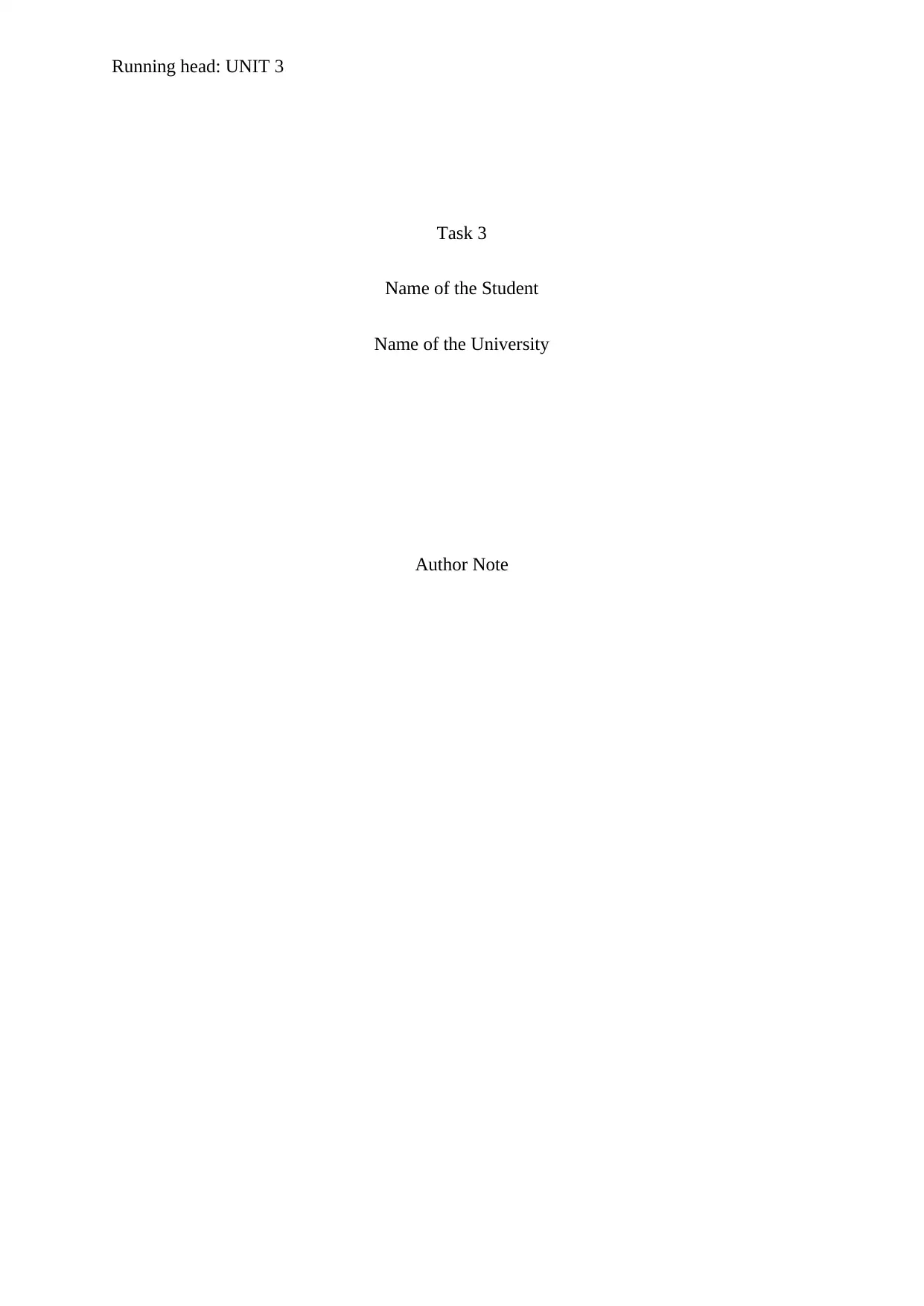
Running head: UNIT 3
Task 3
Name of the Student
Name of the University
Author Note
Task 3
Name of the Student
Name of the University
Author Note
Paraphrase This Document
Need a fresh take? Get an instant paraphrase of this document with our AI Paraphraser
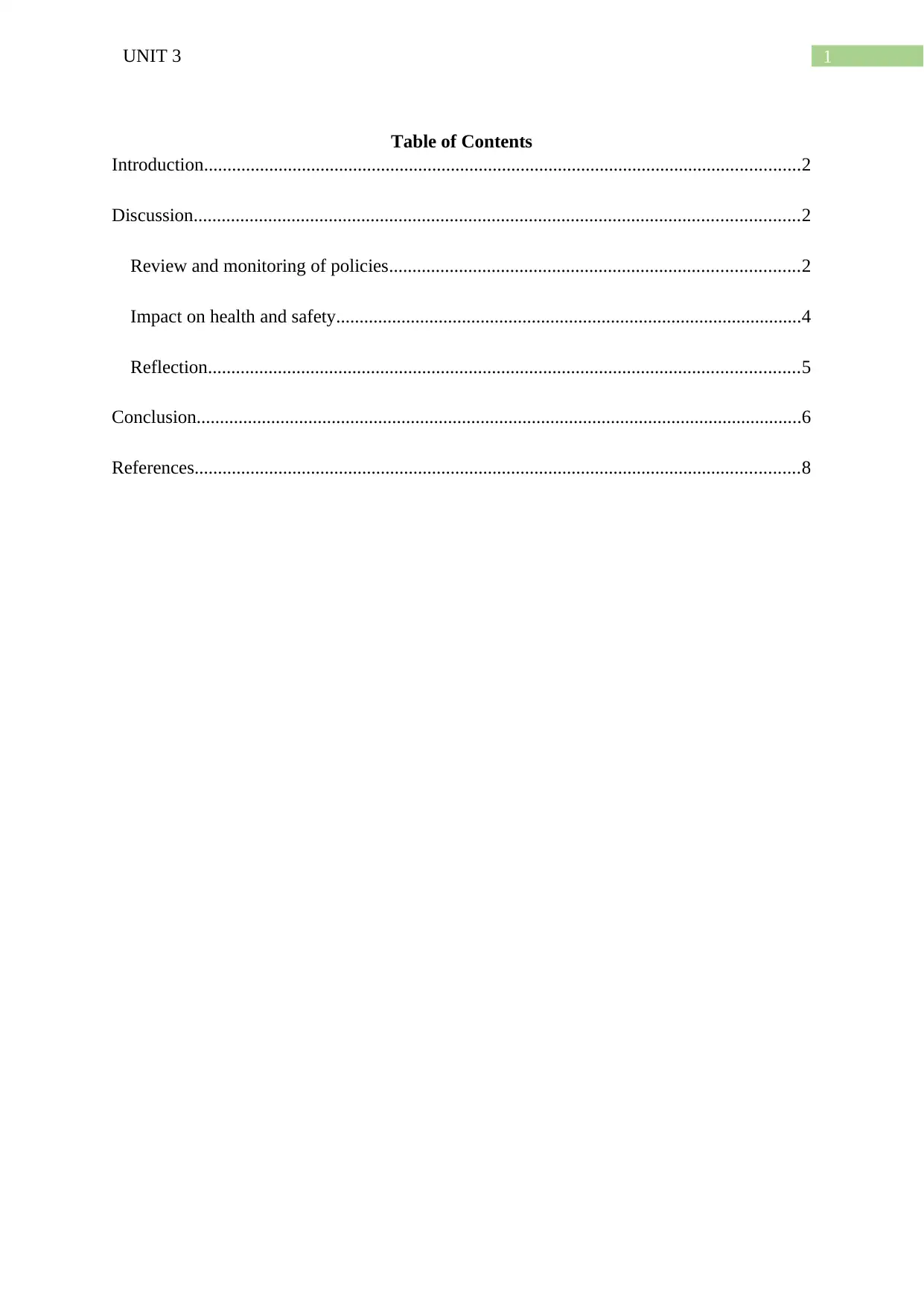
1UNIT 3
Table of Contents
Introduction................................................................................................................................2
Discussion..................................................................................................................................2
Review and monitoring of policies........................................................................................2
Impact on health and safety....................................................................................................4
Reflection...............................................................................................................................5
Conclusion..................................................................................................................................6
References..................................................................................................................................8
Table of Contents
Introduction................................................................................................................................2
Discussion..................................................................................................................................2
Review and monitoring of policies........................................................................................2
Impact on health and safety....................................................................................................4
Reflection...............................................................................................................................5
Conclusion..................................................................................................................................6
References..................................................................................................................................8
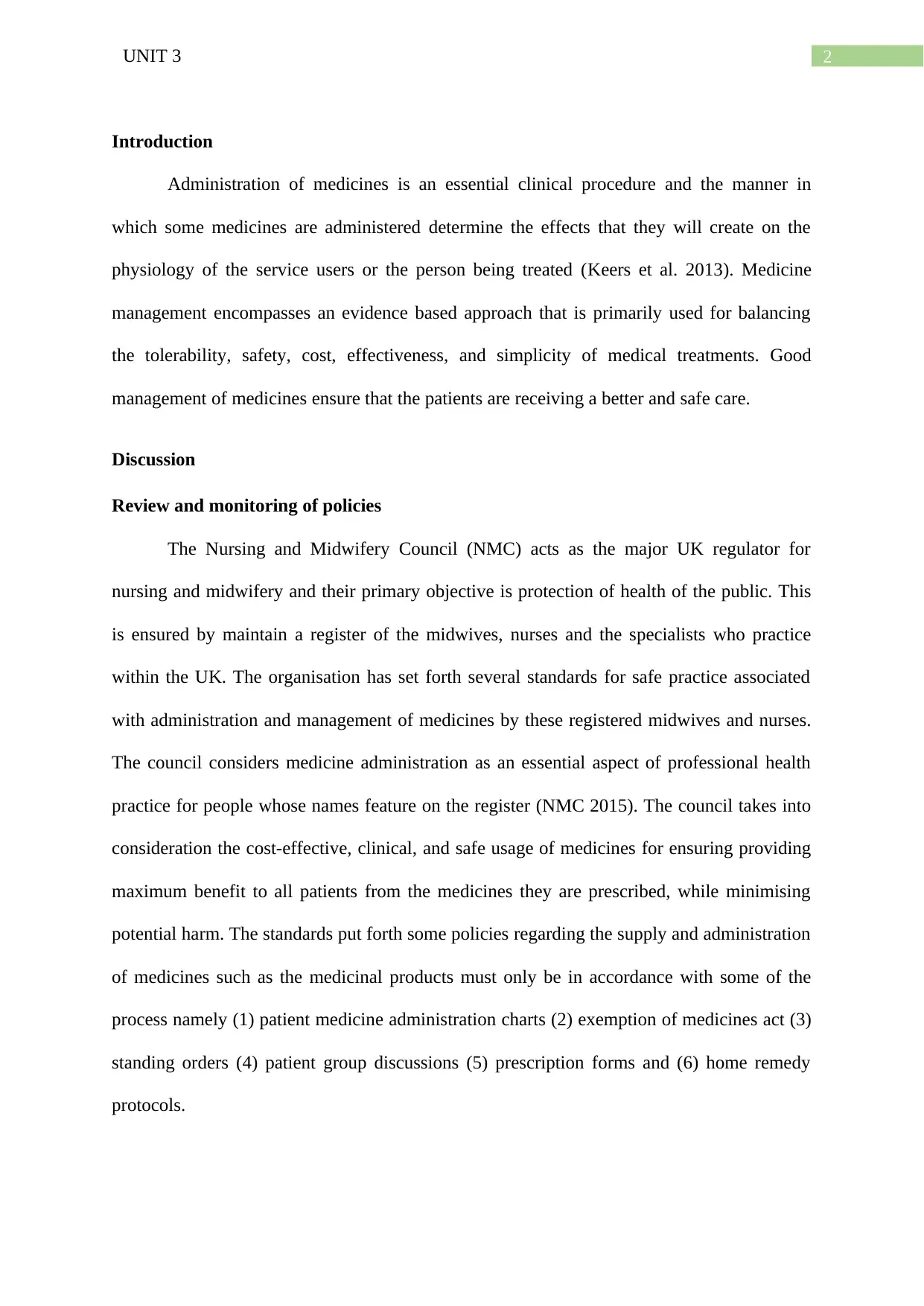
2UNIT 3
Introduction
Administration of medicines is an essential clinical procedure and the manner in
which some medicines are administered determine the effects that they will create on the
physiology of the service users or the person being treated (Keers et al. 2013). Medicine
management encompasses an evidence based approach that is primarily used for balancing
the tolerability, safety, cost, effectiveness, and simplicity of medical treatments. Good
management of medicines ensure that the patients are receiving a better and safe care.
Discussion
Review and monitoring of policies
The Nursing and Midwifery Council (NMC) acts as the major UK regulator for
nursing and midwifery and their primary objective is protection of health of the public. This
is ensured by maintain a register of the midwives, nurses and the specialists who practice
within the UK. The organisation has set forth several standards for safe practice associated
with administration and management of medicines by these registered midwives and nurses.
The council considers medicine administration as an essential aspect of professional health
practice for people whose names feature on the register (NMC 2015). The council takes into
consideration the cost-effective, clinical, and safe usage of medicines for ensuring providing
maximum benefit to all patients from the medicines they are prescribed, while minimising
potential harm. The standards put forth some policies regarding the supply and administration
of medicines such as the medicinal products must only be in accordance with some of the
process namely (1) patient medicine administration charts (2) exemption of medicines act (3)
standing orders (4) patient group discussions (5) prescription forms and (6) home remedy
protocols.
Introduction
Administration of medicines is an essential clinical procedure and the manner in
which some medicines are administered determine the effects that they will create on the
physiology of the service users or the person being treated (Keers et al. 2013). Medicine
management encompasses an evidence based approach that is primarily used for balancing
the tolerability, safety, cost, effectiveness, and simplicity of medical treatments. Good
management of medicines ensure that the patients are receiving a better and safe care.
Discussion
Review and monitoring of policies
The Nursing and Midwifery Council (NMC) acts as the major UK regulator for
nursing and midwifery and their primary objective is protection of health of the public. This
is ensured by maintain a register of the midwives, nurses and the specialists who practice
within the UK. The organisation has set forth several standards for safe practice associated
with administration and management of medicines by these registered midwives and nurses.
The council considers medicine administration as an essential aspect of professional health
practice for people whose names feature on the register (NMC 2015). The council takes into
consideration the cost-effective, clinical, and safe usage of medicines for ensuring providing
maximum benefit to all patients from the medicines they are prescribed, while minimising
potential harm. The standards put forth some policies regarding the supply and administration
of medicines such as the medicinal products must only be in accordance with some of the
process namely (1) patient medicine administration charts (2) exemption of medicines act (3)
standing orders (4) patient group discussions (5) prescription forms and (6) home remedy
protocols.
⊘ This is a preview!⊘
Do you want full access?
Subscribe today to unlock all pages.

Trusted by 1+ million students worldwide
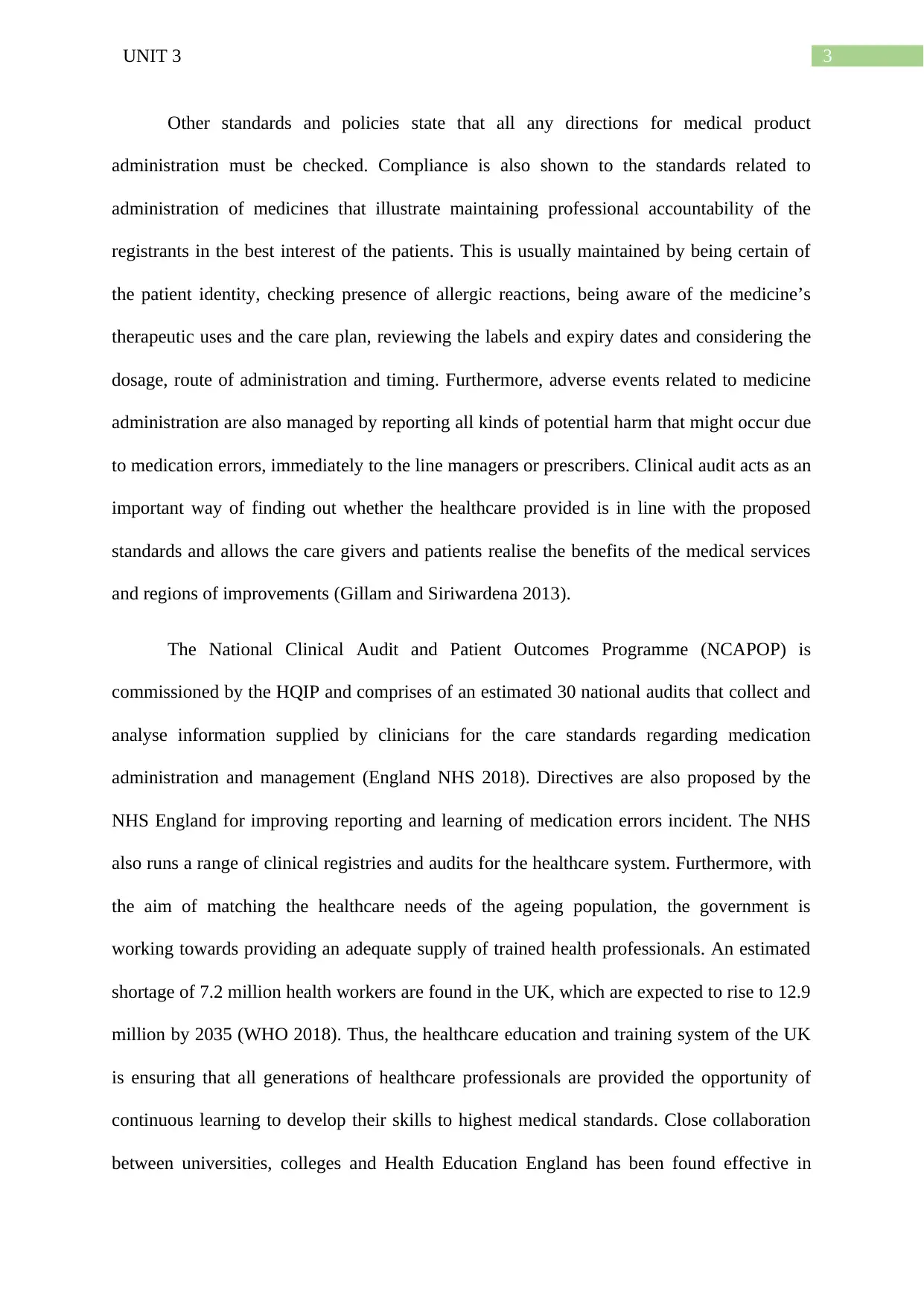
3UNIT 3
Other standards and policies state that all any directions for medical product
administration must be checked. Compliance is also shown to the standards related to
administration of medicines that illustrate maintaining professional accountability of the
registrants in the best interest of the patients. This is usually maintained by being certain of
the patient identity, checking presence of allergic reactions, being aware of the medicine’s
therapeutic uses and the care plan, reviewing the labels and expiry dates and considering the
dosage, route of administration and timing. Furthermore, adverse events related to medicine
administration are also managed by reporting all kinds of potential harm that might occur due
to medication errors, immediately to the line managers or prescribers. Clinical audit acts as an
important way of finding out whether the healthcare provided is in line with the proposed
standards and allows the care givers and patients realise the benefits of the medical services
and regions of improvements (Gillam and Siriwardena 2013).
The National Clinical Audit and Patient Outcomes Programme (NCAPOP) is
commissioned by the HQIP and comprises of an estimated 30 national audits that collect and
analyse information supplied by clinicians for the care standards regarding medication
administration and management (England NHS 2018). Directives are also proposed by the
NHS England for improving reporting and learning of medication errors incident. The NHS
also runs a range of clinical registries and audits for the healthcare system. Furthermore, with
the aim of matching the healthcare needs of the ageing population, the government is
working towards providing an adequate supply of trained health professionals. An estimated
shortage of 7.2 million health workers are found in the UK, which are expected to rise to 12.9
million by 2035 (WHO 2018). Thus, the healthcare education and training system of the UK
is ensuring that all generations of healthcare professionals are provided the opportunity of
continuous learning to develop their skills to highest medical standards. Close collaboration
between universities, colleges and Health Education England has been found effective in
Other standards and policies state that all any directions for medical product
administration must be checked. Compliance is also shown to the standards related to
administration of medicines that illustrate maintaining professional accountability of the
registrants in the best interest of the patients. This is usually maintained by being certain of
the patient identity, checking presence of allergic reactions, being aware of the medicine’s
therapeutic uses and the care plan, reviewing the labels and expiry dates and considering the
dosage, route of administration and timing. Furthermore, adverse events related to medicine
administration are also managed by reporting all kinds of potential harm that might occur due
to medication errors, immediately to the line managers or prescribers. Clinical audit acts as an
important way of finding out whether the healthcare provided is in line with the proposed
standards and allows the care givers and patients realise the benefits of the medical services
and regions of improvements (Gillam and Siriwardena 2013).
The National Clinical Audit and Patient Outcomes Programme (NCAPOP) is
commissioned by the HQIP and comprises of an estimated 30 national audits that collect and
analyse information supplied by clinicians for the care standards regarding medication
administration and management (England NHS 2018). Directives are also proposed by the
NHS England for improving reporting and learning of medication errors incident. The NHS
also runs a range of clinical registries and audits for the healthcare system. Furthermore, with
the aim of matching the healthcare needs of the ageing population, the government is
working towards providing an adequate supply of trained health professionals. An estimated
shortage of 7.2 million health workers are found in the UK, which are expected to rise to 12.9
million by 2035 (WHO 2018). Thus, the healthcare education and training system of the UK
is ensuring that all generations of healthcare professionals are provided the opportunity of
continuous learning to develop their skills to highest medical standards. Close collaboration
between universities, colleges and Health Education England has been found effective in
Paraphrase This Document
Need a fresh take? Get an instant paraphrase of this document with our AI Paraphraser
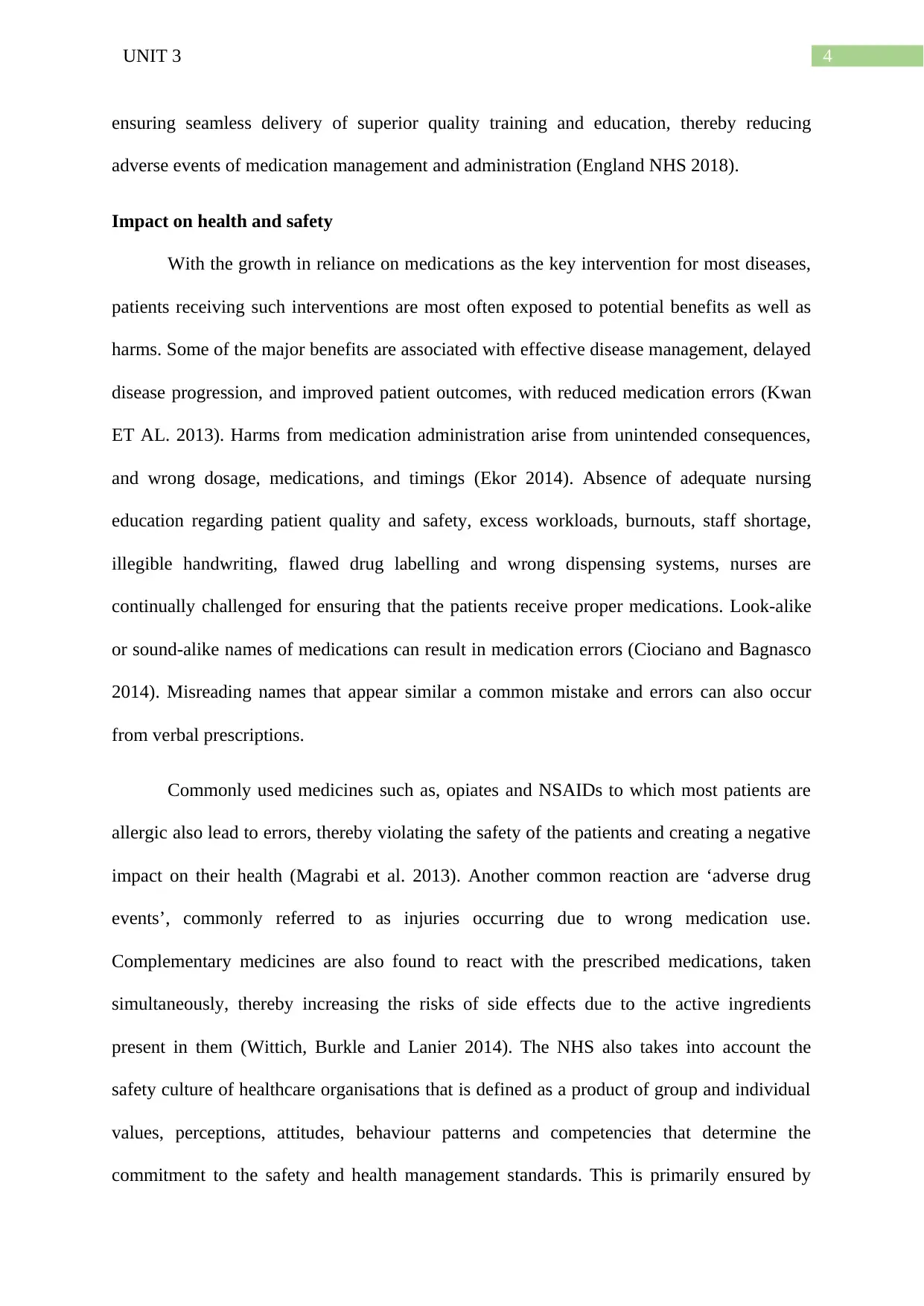
4UNIT 3
ensuring seamless delivery of superior quality training and education, thereby reducing
adverse events of medication management and administration (England NHS 2018).
Impact on health and safety
With the growth in reliance on medications as the key intervention for most diseases,
patients receiving such interventions are most often exposed to potential benefits as well as
harms. Some of the major benefits are associated with effective disease management, delayed
disease progression, and improved patient outcomes, with reduced medication errors (Kwan
ET AL. 2013). Harms from medication administration arise from unintended consequences,
and wrong dosage, medications, and timings (Ekor 2014). Absence of adequate nursing
education regarding patient quality and safety, excess workloads, burnouts, staff shortage,
illegible handwriting, flawed drug labelling and wrong dispensing systems, nurses are
continually challenged for ensuring that the patients receive proper medications. Look-alike
or sound-alike names of medications can result in medication errors (Ciociano and Bagnasco
2014). Misreading names that appear similar a common mistake and errors can also occur
from verbal prescriptions.
Commonly used medicines such as, opiates and NSAIDs to which most patients are
allergic also lead to errors, thereby violating the safety of the patients and creating a negative
impact on their health (Magrabi et al. 2013). Another common reaction are ‘adverse drug
events’, commonly referred to as injuries occurring due to wrong medication use.
Complementary medicines are also found to react with the prescribed medications, taken
simultaneously, thereby increasing the risks of side effects due to the active ingredients
present in them (Wittich, Burkle and Lanier 2014). The NHS also takes into account the
safety culture of healthcare organisations that is defined as a product of group and individual
values, perceptions, attitudes, behaviour patterns and competencies that determine the
commitment to the safety and health management standards. This is primarily ensured by
ensuring seamless delivery of superior quality training and education, thereby reducing
adverse events of medication management and administration (England NHS 2018).
Impact on health and safety
With the growth in reliance on medications as the key intervention for most diseases,
patients receiving such interventions are most often exposed to potential benefits as well as
harms. Some of the major benefits are associated with effective disease management, delayed
disease progression, and improved patient outcomes, with reduced medication errors (Kwan
ET AL. 2013). Harms from medication administration arise from unintended consequences,
and wrong dosage, medications, and timings (Ekor 2014). Absence of adequate nursing
education regarding patient quality and safety, excess workloads, burnouts, staff shortage,
illegible handwriting, flawed drug labelling and wrong dispensing systems, nurses are
continually challenged for ensuring that the patients receive proper medications. Look-alike
or sound-alike names of medications can result in medication errors (Ciociano and Bagnasco
2014). Misreading names that appear similar a common mistake and errors can also occur
from verbal prescriptions.
Commonly used medicines such as, opiates and NSAIDs to which most patients are
allergic also lead to errors, thereby violating the safety of the patients and creating a negative
impact on their health (Magrabi et al. 2013). Another common reaction are ‘adverse drug
events’, commonly referred to as injuries occurring due to wrong medication use.
Complementary medicines are also found to react with the prescribed medications, taken
simultaneously, thereby increasing the risks of side effects due to the active ingredients
present in them (Wittich, Burkle and Lanier 2014). The NHS also takes into account the
safety culture of healthcare organisations that is defined as a product of group and individual
values, perceptions, attitudes, behaviour patterns and competencies that determine the
commitment to the safety and health management standards. This is primarily ensured by
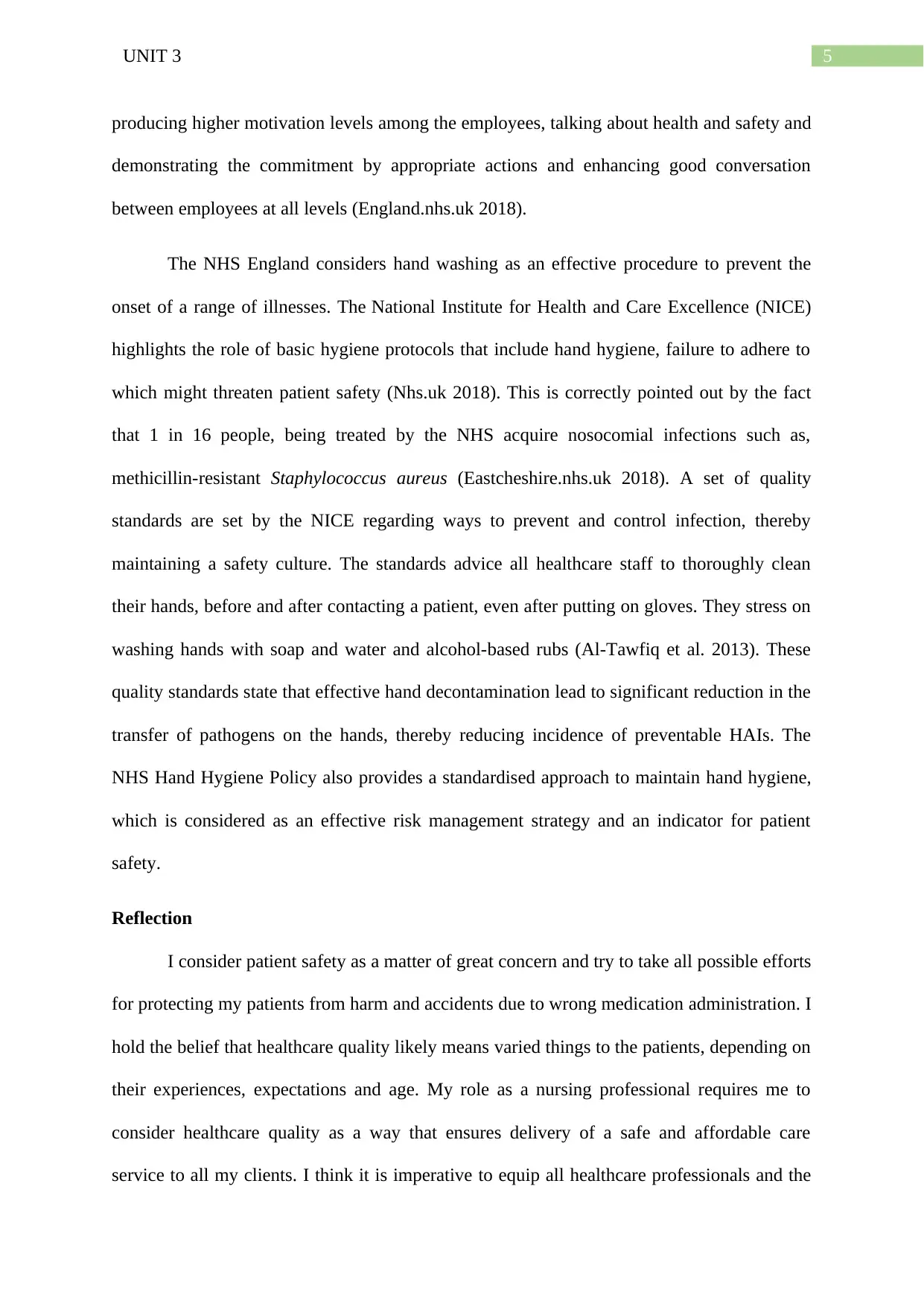
5UNIT 3
producing higher motivation levels among the employees, talking about health and safety and
demonstrating the commitment by appropriate actions and enhancing good conversation
between employees at all levels (England.nhs.uk 2018).
The NHS England considers hand washing as an effective procedure to prevent the
onset of a range of illnesses. The National Institute for Health and Care Excellence (NICE)
highlights the role of basic hygiene protocols that include hand hygiene, failure to adhere to
which might threaten patient safety (Nhs.uk 2018). This is correctly pointed out by the fact
that 1 in 16 people, being treated by the NHS acquire nosocomial infections such as,
methicillin-resistant Staphylococcus aureus (Eastcheshire.nhs.uk 2018). A set of quality
standards are set by the NICE regarding ways to prevent and control infection, thereby
maintaining a safety culture. The standards advice all healthcare staff to thoroughly clean
their hands, before and after contacting a patient, even after putting on gloves. They stress on
washing hands with soap and water and alcohol-based rubs (Al-Tawfiq et al. 2013). These
quality standards state that effective hand decontamination lead to significant reduction in the
transfer of pathogens on the hands, thereby reducing incidence of preventable HAIs. The
NHS Hand Hygiene Policy also provides a standardised approach to maintain hand hygiene,
which is considered as an effective risk management strategy and an indicator for patient
safety.
Reflection
I consider patient safety as a matter of great concern and try to take all possible efforts
for protecting my patients from harm and accidents due to wrong medication administration. I
hold the belief that healthcare quality likely means varied things to the patients, depending on
their experiences, expectations and age. My role as a nursing professional requires me to
consider healthcare quality as a way that ensures delivery of a safe and affordable care
service to all my clients. I think it is imperative to equip all healthcare professionals and the
producing higher motivation levels among the employees, talking about health and safety and
demonstrating the commitment by appropriate actions and enhancing good conversation
between employees at all levels (England.nhs.uk 2018).
The NHS England considers hand washing as an effective procedure to prevent the
onset of a range of illnesses. The National Institute for Health and Care Excellence (NICE)
highlights the role of basic hygiene protocols that include hand hygiene, failure to adhere to
which might threaten patient safety (Nhs.uk 2018). This is correctly pointed out by the fact
that 1 in 16 people, being treated by the NHS acquire nosocomial infections such as,
methicillin-resistant Staphylococcus aureus (Eastcheshire.nhs.uk 2018). A set of quality
standards are set by the NICE regarding ways to prevent and control infection, thereby
maintaining a safety culture. The standards advice all healthcare staff to thoroughly clean
their hands, before and after contacting a patient, even after putting on gloves. They stress on
washing hands with soap and water and alcohol-based rubs (Al-Tawfiq et al. 2013). These
quality standards state that effective hand decontamination lead to significant reduction in the
transfer of pathogens on the hands, thereby reducing incidence of preventable HAIs. The
NHS Hand Hygiene Policy also provides a standardised approach to maintain hand hygiene,
which is considered as an effective risk management strategy and an indicator for patient
safety.
Reflection
I consider patient safety as a matter of great concern and try to take all possible efforts
for protecting my patients from harm and accidents due to wrong medication administration. I
hold the belief that healthcare quality likely means varied things to the patients, depending on
their experiences, expectations and age. My role as a nursing professional requires me to
consider healthcare quality as a way that ensures delivery of a safe and affordable care
service to all my clients. I think it is imperative to equip all healthcare professionals and the
⊘ This is a preview!⊘
Do you want full access?
Subscribe today to unlock all pages.

Trusted by 1+ million students worldwide
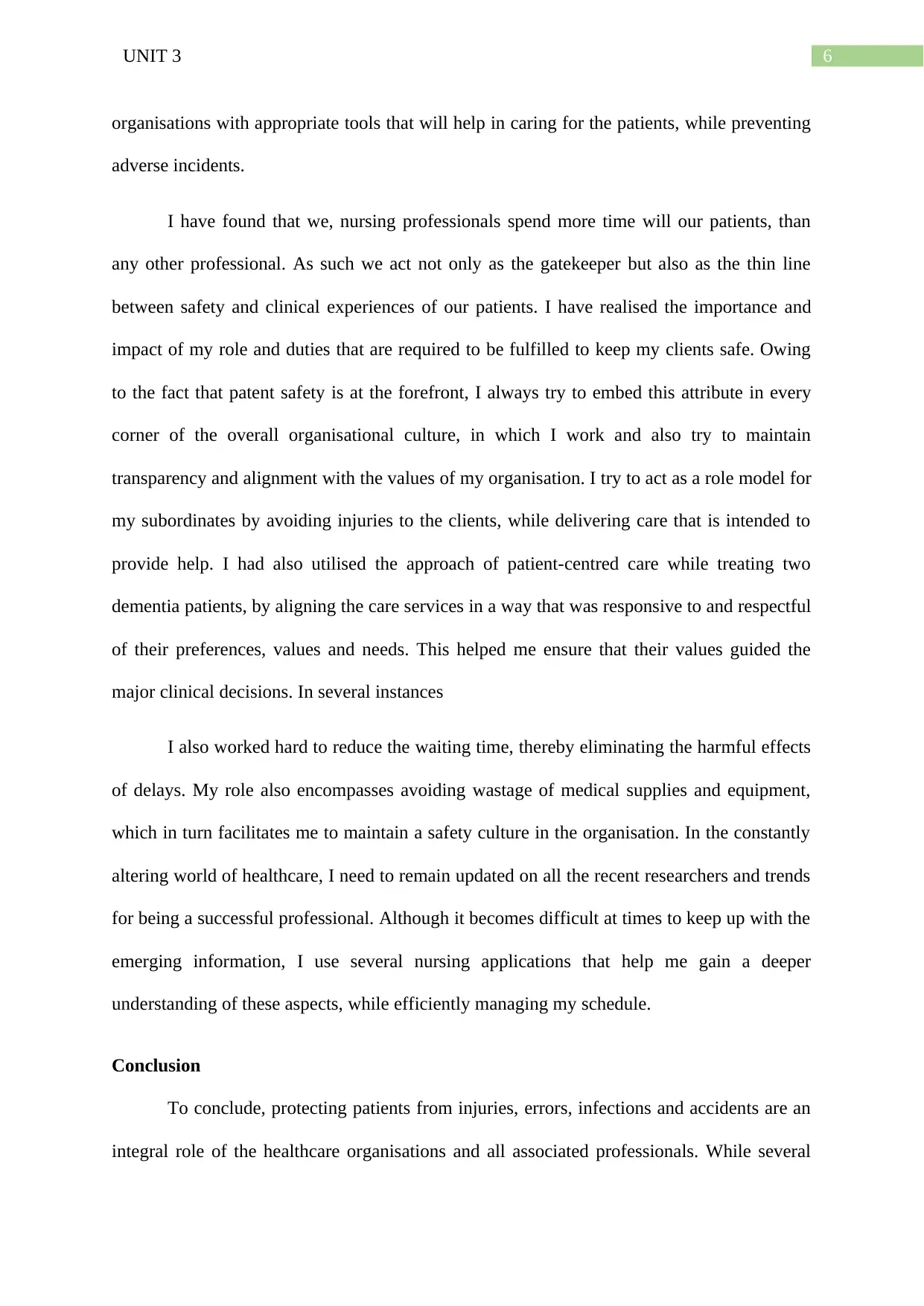
6UNIT 3
organisations with appropriate tools that will help in caring for the patients, while preventing
adverse incidents.
I have found that we, nursing professionals spend more time will our patients, than
any other professional. As such we act not only as the gatekeeper but also as the thin line
between safety and clinical experiences of our patients. I have realised the importance and
impact of my role and duties that are required to be fulfilled to keep my clients safe. Owing
to the fact that patent safety is at the forefront, I always try to embed this attribute in every
corner of the overall organisational culture, in which I work and also try to maintain
transparency and alignment with the values of my organisation. I try to act as a role model for
my subordinates by avoiding injuries to the clients, while delivering care that is intended to
provide help. I had also utilised the approach of patient-centred care while treating two
dementia patients, by aligning the care services in a way that was responsive to and respectful
of their preferences, values and needs. This helped me ensure that their values guided the
major clinical decisions. In several instances
I also worked hard to reduce the waiting time, thereby eliminating the harmful effects
of delays. My role also encompasses avoiding wastage of medical supplies and equipment,
which in turn facilitates me to maintain a safety culture in the organisation. In the constantly
altering world of healthcare, I need to remain updated on all the recent researchers and trends
for being a successful professional. Although it becomes difficult at times to keep up with the
emerging information, I use several nursing applications that help me gain a deeper
understanding of these aspects, while efficiently managing my schedule.
Conclusion
To conclude, protecting patients from injuries, errors, infections and accidents are an
integral role of the healthcare organisations and all associated professionals. While several
organisations with appropriate tools that will help in caring for the patients, while preventing
adverse incidents.
I have found that we, nursing professionals spend more time will our patients, than
any other professional. As such we act not only as the gatekeeper but also as the thin line
between safety and clinical experiences of our patients. I have realised the importance and
impact of my role and duties that are required to be fulfilled to keep my clients safe. Owing
to the fact that patent safety is at the forefront, I always try to embed this attribute in every
corner of the overall organisational culture, in which I work and also try to maintain
transparency and alignment with the values of my organisation. I try to act as a role model for
my subordinates by avoiding injuries to the clients, while delivering care that is intended to
provide help. I had also utilised the approach of patient-centred care while treating two
dementia patients, by aligning the care services in a way that was responsive to and respectful
of their preferences, values and needs. This helped me ensure that their values guided the
major clinical decisions. In several instances
I also worked hard to reduce the waiting time, thereby eliminating the harmful effects
of delays. My role also encompasses avoiding wastage of medical supplies and equipment,
which in turn facilitates me to maintain a safety culture in the organisation. In the constantly
altering world of healthcare, I need to remain updated on all the recent researchers and trends
for being a successful professional. Although it becomes difficult at times to keep up with the
emerging information, I use several nursing applications that help me gain a deeper
understanding of these aspects, while efficiently managing my schedule.
Conclusion
To conclude, protecting patients from injuries, errors, infections and accidents are an
integral role of the healthcare organisations and all associated professionals. While several
Paraphrase This Document
Need a fresh take? Get an instant paraphrase of this document with our AI Paraphraser
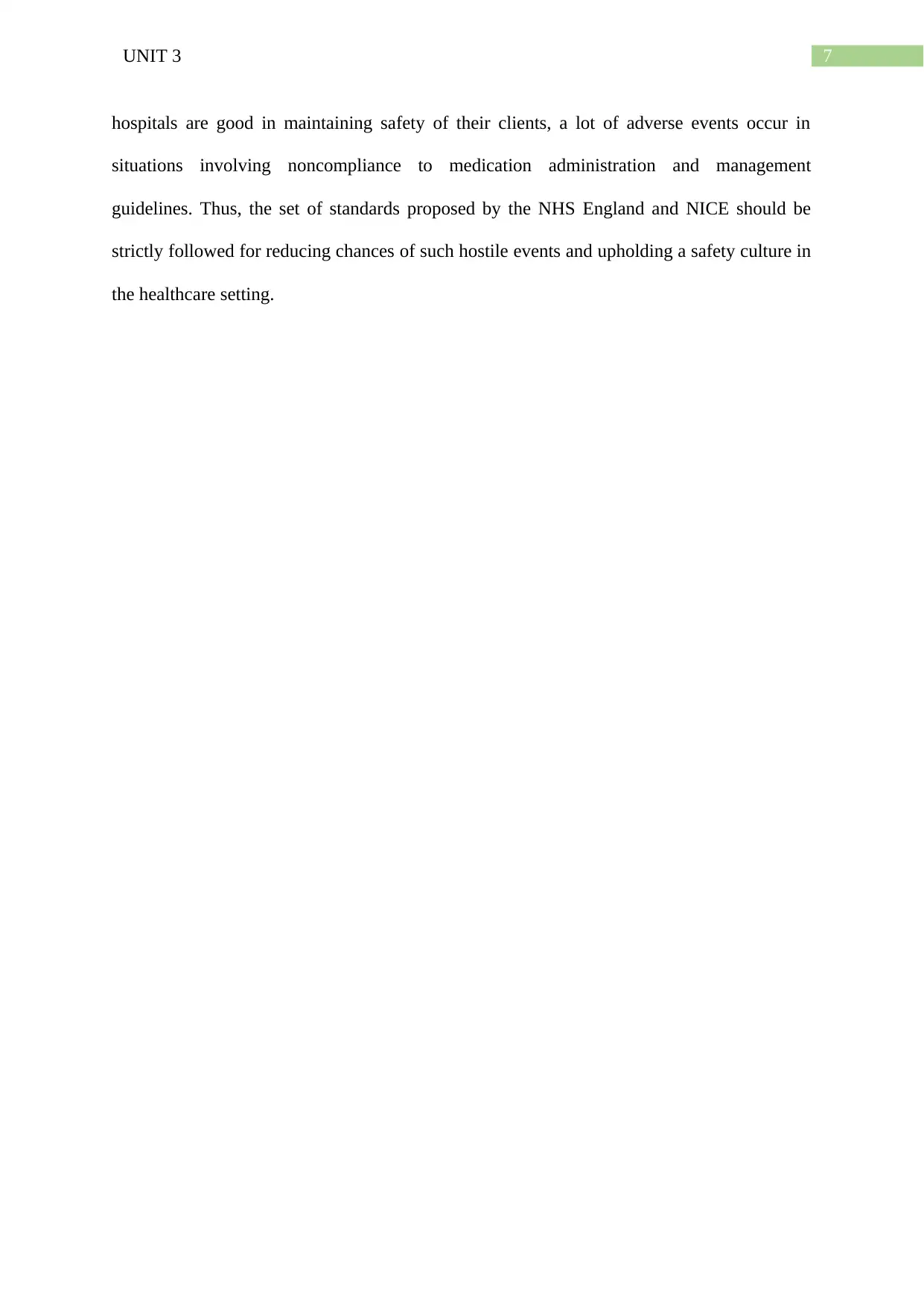
7UNIT 3
hospitals are good in maintaining safety of their clients, a lot of adverse events occur in
situations involving noncompliance to medication administration and management
guidelines. Thus, the set of standards proposed by the NHS England and NICE should be
strictly followed for reducing chances of such hostile events and upholding a safety culture in
the healthcare setting.
hospitals are good in maintaining safety of their clients, a lot of adverse events occur in
situations involving noncompliance to medication administration and management
guidelines. Thus, the set of standards proposed by the NHS England and NICE should be
strictly followed for reducing chances of such hostile events and upholding a safety culture in
the healthcare setting.
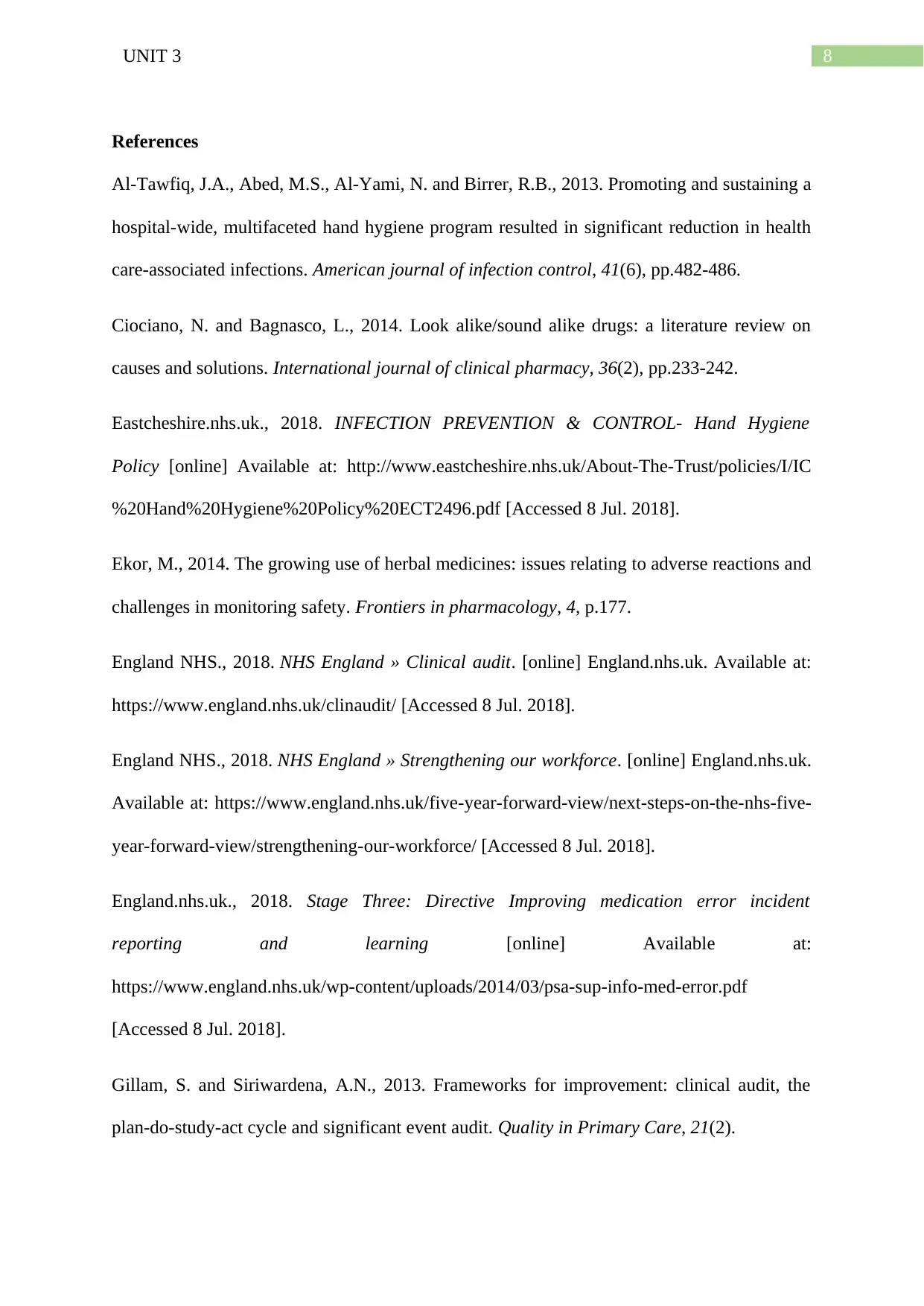
8UNIT 3
References
Al-Tawfiq, J.A., Abed, M.S., Al-Yami, N. and Birrer, R.B., 2013. Promoting and sustaining a
hospital-wide, multifaceted hand hygiene program resulted in significant reduction in health
care-associated infections. American journal of infection control, 41(6), pp.482-486.
Ciociano, N. and Bagnasco, L., 2014. Look alike/sound alike drugs: a literature review on
causes and solutions. International journal of clinical pharmacy, 36(2), pp.233-242.
Eastcheshire.nhs.uk., 2018. INFECTION PREVENTION & CONTROL- Hand Hygiene
Policy [online] Available at: http://www.eastcheshire.nhs.uk/About-The-Trust/policies/I/IC
%20Hand%20Hygiene%20Policy%20ECT2496.pdf [Accessed 8 Jul. 2018].
Ekor, M., 2014. The growing use of herbal medicines: issues relating to adverse reactions and
challenges in monitoring safety. Frontiers in pharmacology, 4, p.177.
England NHS., 2018. NHS England » Clinical audit. [online] England.nhs.uk. Available at:
https://www.england.nhs.uk/clinaudit/ [Accessed 8 Jul. 2018].
England NHS., 2018. NHS England » Strengthening our workforce. [online] England.nhs.uk.
Available at: https://www.england.nhs.uk/five-year-forward-view/next-steps-on-the-nhs-five-
year-forward-view/strengthening-our-workforce/ [Accessed 8 Jul. 2018].
England.nhs.uk., 2018. Stage Three: Directive Improving medication error incident
reporting and learning [online] Available at:
https://www.england.nhs.uk/wp-content/uploads/2014/03/psa-sup-info-med-error.pdf
[Accessed 8 Jul. 2018].
Gillam, S. and Siriwardena, A.N., 2013. Frameworks for improvement: clinical audit, the
plan-do-study-act cycle and significant event audit. Quality in Primary Care, 21(2).
References
Al-Tawfiq, J.A., Abed, M.S., Al-Yami, N. and Birrer, R.B., 2013. Promoting and sustaining a
hospital-wide, multifaceted hand hygiene program resulted in significant reduction in health
care-associated infections. American journal of infection control, 41(6), pp.482-486.
Ciociano, N. and Bagnasco, L., 2014. Look alike/sound alike drugs: a literature review on
causes and solutions. International journal of clinical pharmacy, 36(2), pp.233-242.
Eastcheshire.nhs.uk., 2018. INFECTION PREVENTION & CONTROL- Hand Hygiene
Policy [online] Available at: http://www.eastcheshire.nhs.uk/About-The-Trust/policies/I/IC
%20Hand%20Hygiene%20Policy%20ECT2496.pdf [Accessed 8 Jul. 2018].
Ekor, M., 2014. The growing use of herbal medicines: issues relating to adverse reactions and
challenges in monitoring safety. Frontiers in pharmacology, 4, p.177.
England NHS., 2018. NHS England » Clinical audit. [online] England.nhs.uk. Available at:
https://www.england.nhs.uk/clinaudit/ [Accessed 8 Jul. 2018].
England NHS., 2018. NHS England » Strengthening our workforce. [online] England.nhs.uk.
Available at: https://www.england.nhs.uk/five-year-forward-view/next-steps-on-the-nhs-five-
year-forward-view/strengthening-our-workforce/ [Accessed 8 Jul. 2018].
England.nhs.uk., 2018. Stage Three: Directive Improving medication error incident
reporting and learning [online] Available at:
https://www.england.nhs.uk/wp-content/uploads/2014/03/psa-sup-info-med-error.pdf
[Accessed 8 Jul. 2018].
Gillam, S. and Siriwardena, A.N., 2013. Frameworks for improvement: clinical audit, the
plan-do-study-act cycle and significant event audit. Quality in Primary Care, 21(2).
⊘ This is a preview!⊘
Do you want full access?
Subscribe today to unlock all pages.

Trusted by 1+ million students worldwide
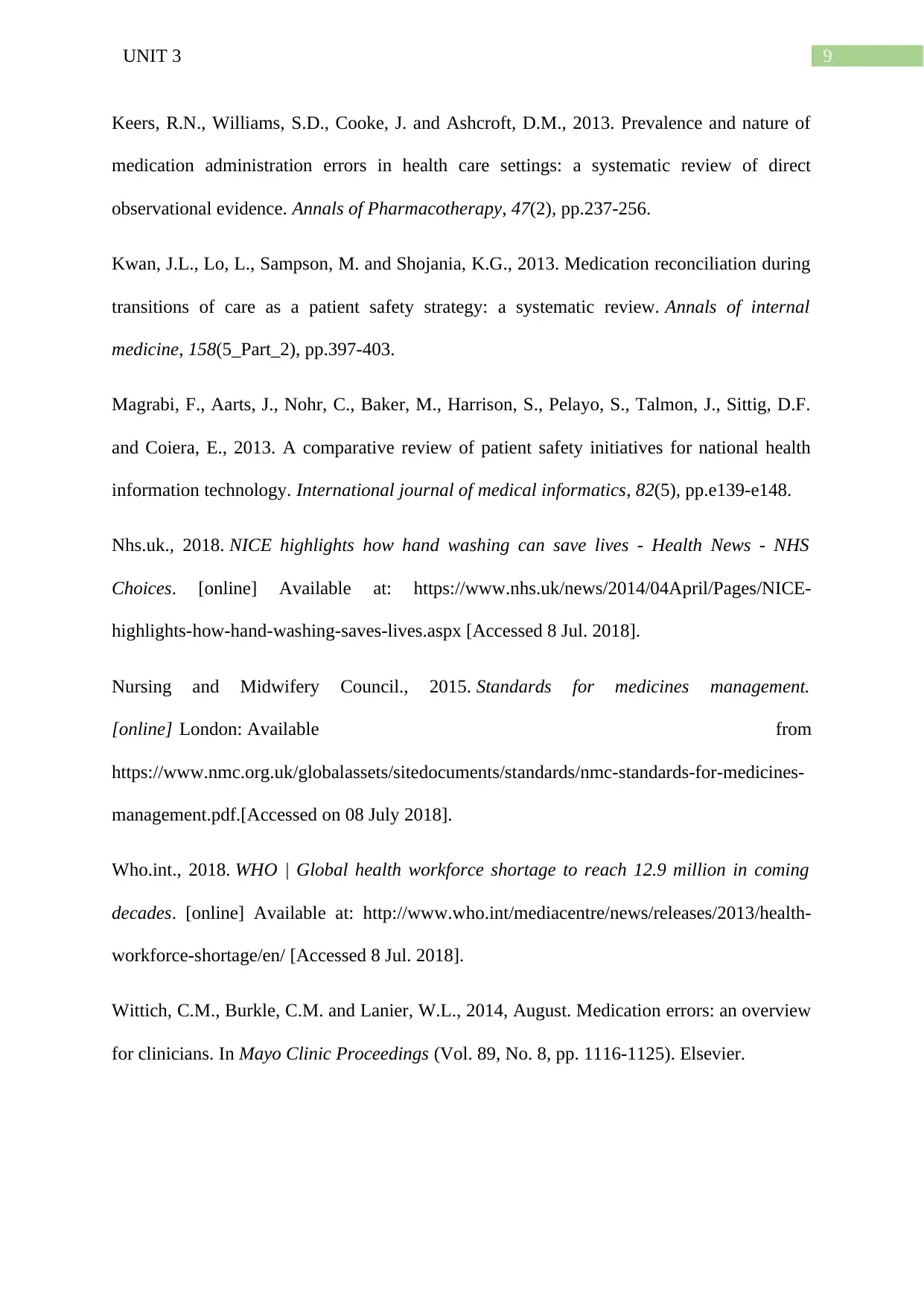
9UNIT 3
Keers, R.N., Williams, S.D., Cooke, J. and Ashcroft, D.M., 2013. Prevalence and nature of
medication administration errors in health care settings: a systematic review of direct
observational evidence. Annals of Pharmacotherapy, 47(2), pp.237-256.
Kwan, J.L., Lo, L., Sampson, M. and Shojania, K.G., 2013. Medication reconciliation during
transitions of care as a patient safety strategy: a systematic review. Annals of internal
medicine, 158(5_Part_2), pp.397-403.
Magrabi, F., Aarts, J., Nohr, C., Baker, M., Harrison, S., Pelayo, S., Talmon, J., Sittig, D.F.
and Coiera, E., 2013. A comparative review of patient safety initiatives for national health
information technology. International journal of medical informatics, 82(5), pp.e139-e148.
Nhs.uk., 2018. NICE highlights how hand washing can save lives - Health News - NHS
Choices. [online] Available at: https://www.nhs.uk/news/2014/04April/Pages/NICE-
highlights-how-hand-washing-saves-lives.aspx [Accessed 8 Jul. 2018].
Nursing and Midwifery Council., 2015. Standards for medicines management.
[online] London: Available from
https://www.nmc.org.uk/globalassets/sitedocuments/standards/nmc-standards-for-medicines-
management.pdf.[Accessed on 08 July 2018].
Who.int., 2018. WHO | Global health workforce shortage to reach 12.9 million in coming
decades. [online] Available at: http://www.who.int/mediacentre/news/releases/2013/health-
workforce-shortage/en/ [Accessed 8 Jul. 2018].
Wittich, C.M., Burkle, C.M. and Lanier, W.L., 2014, August. Medication errors: an overview
for clinicians. In Mayo Clinic Proceedings (Vol. 89, No. 8, pp. 1116-1125). Elsevier.
Keers, R.N., Williams, S.D., Cooke, J. and Ashcroft, D.M., 2013. Prevalence and nature of
medication administration errors in health care settings: a systematic review of direct
observational evidence. Annals of Pharmacotherapy, 47(2), pp.237-256.
Kwan, J.L., Lo, L., Sampson, M. and Shojania, K.G., 2013. Medication reconciliation during
transitions of care as a patient safety strategy: a systematic review. Annals of internal
medicine, 158(5_Part_2), pp.397-403.
Magrabi, F., Aarts, J., Nohr, C., Baker, M., Harrison, S., Pelayo, S., Talmon, J., Sittig, D.F.
and Coiera, E., 2013. A comparative review of patient safety initiatives for national health
information technology. International journal of medical informatics, 82(5), pp.e139-e148.
Nhs.uk., 2018. NICE highlights how hand washing can save lives - Health News - NHS
Choices. [online] Available at: https://www.nhs.uk/news/2014/04April/Pages/NICE-
highlights-how-hand-washing-saves-lives.aspx [Accessed 8 Jul. 2018].
Nursing and Midwifery Council., 2015. Standards for medicines management.
[online] London: Available from
https://www.nmc.org.uk/globalassets/sitedocuments/standards/nmc-standards-for-medicines-
management.pdf.[Accessed on 08 July 2018].
Who.int., 2018. WHO | Global health workforce shortage to reach 12.9 million in coming
decades. [online] Available at: http://www.who.int/mediacentre/news/releases/2013/health-
workforce-shortage/en/ [Accessed 8 Jul. 2018].
Wittich, C.M., Burkle, C.M. and Lanier, W.L., 2014, August. Medication errors: an overview
for clinicians. In Mayo Clinic Proceedings (Vol. 89, No. 8, pp. 1116-1125). Elsevier.
Paraphrase This Document
Need a fresh take? Get an instant paraphrase of this document with our AI Paraphraser

10UNIT 3
1 out of 11
Related Documents
Your All-in-One AI-Powered Toolkit for Academic Success.
+13062052269
info@desklib.com
Available 24*7 on WhatsApp / Email
![[object Object]](/_next/static/media/star-bottom.7253800d.svg)
Unlock your academic potential
Copyright © 2020–2026 A2Z Services. All Rights Reserved. Developed and managed by ZUCOL.





